学术英语写作Unit-11-Oral-Presentation
最新The-Oral-Presentation精品资料
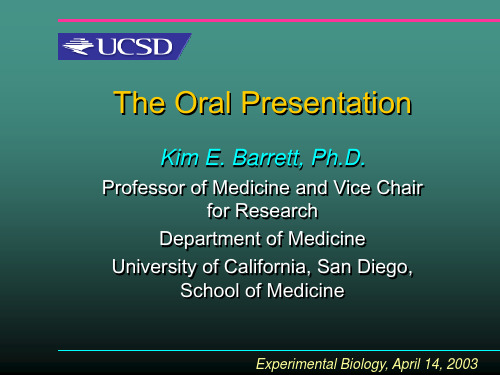
The oral presentation
Outline
• Why am I subjecting myself to this torture?
• Defining the task • Nuts and bolts of preparing a talk • Delivering the talk itself
Your paper is scheduled in the session “Health predictors for student life” to be held in Room 11 of the Convention Center from 8.30 – 10.00 am on Monday, April 14, 2003. Please take note of the enclosed guidelines for preparation of your Powerpoint presentation. Speakers must provide their own laptops, and should report to the session room at…………
School of Medicine
Experimental Biology, April 14, 2003
The oral presentation
Congratulations?
Dear Dr. Jones:
Congratulations!!! We are pleased to inform you that your abstract entitled “Physiological effects of beer drinking in University of California undergraduates” has been accepted for oral presentation at Experimental Biology, to be held in San Diego, California.
学术英语I-Academic English I

Week 14
Unit 5 Education
pp.103-104
Exam Revision --
Reading & listening
skills, grammar and
vocabulary
Letter writing
-Reading comprehension
-Vocabulary in context
Pre-requisites
The students English level is around 4.5-5.0 IELTS, that is at the Intermediate and Lower Intermediate English level.
Intended Learning Outcomes
Analysing paragraph structure
Grammar - using future tense
Speaking Test (individual assessment in group discussion) – 10% out of 35% End of Semester (EOS) exams
Describe feelings and emotions
Deliver an oral presentation
Use formal and informal language in context
Listening
Listen for main points and specific information
opinions, turn taking), oral presentation (structure, eye contact, voice projection, etc.); Writing revision
Unit 11 学术性口译

Unit 11 Interpreting Academic Speech 学术性口译11--1 The Linguistic System 语言系统Vocabulary1、mutually unintelligible 互不相通unintelligible: 难解的,无法了解的difficult to understand2、in broad outlines 概貌3、approach (a problem) 处理问题do with/cope with4、be intimately familiar with 通晓intimately: 密切地5、a finite set of rules 数量有限的规则6、an infinite set of sentences 数量无限的句子7、acquire (a language) 习得(一门语言)8、an arbitrary fashion 任意的9、linguistic knowledge/competence 语言知识/能力10、creative aspect 创造能力11、well-formed (sentence) 符合规范的句子典型句型1In their broad outlines, in their basic principles, and even in the way they approach certain specific problems of communication, languages have a great deal in common.从语言的概貌,基本原则,甚至对一些具体问题的交际方法上看,语言有着诸多的共同点。
典型句型2Speakers use a finite set of rules to produce and understand an infinite set of sentences. These rules comprise the grammar of a language, which is learned when you acquire the language.说话者可以运用一组数量有限的规则来表达与理解数量无限的句子。
学术英语写作Unit 11 Oral Presentation
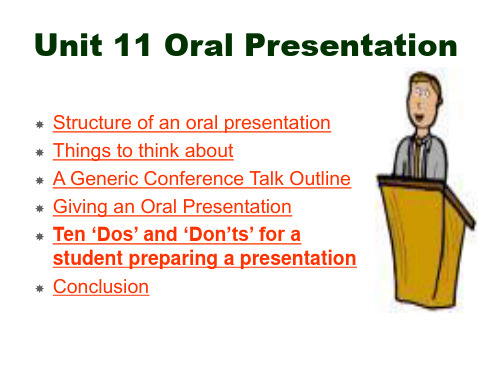
(continued)
Future Work (0-1 slides) Optionally give problems this research opens up. Backup Slides (0-3 slides) Optionally have a few slides ready (not counted in your talk total) to answer expected questions. (Likely question areas: ideas glossed over, shortcomings of methods or results, and future work.)
Giving an Oral Presentation
Preparing your oral presentation Organising the content Delivering your presentation Using visual aids Dealing with nervousness
The body
Present your main points one by one in logical order. Pause at the end of each point (give people time to take notes, or time to think about what you are saying). Make it absolutely clear when you move to another point. For example: ‘The next point is that ...’ ‘OK, now I am going to talk about ...’ ‘Right. Now I'd like to explain ... ’ ‘Of course, we must not forget that ...’ ‘However, it's important to realise that...’ Use clear examples to illustrate your points. Use visual aids to make your presentation more interesting.
如何做presentation英文学术

如何做presentation英文学术全文共6篇示例,供读者参考篇1How to Do an Academic PresentationHey there, kids! Have you ever had to stand in front of your class and give a presentation? It can be a little scary, can't it? But don't worry, with a bit of practice and some helpful tips, you'll be a presentation pro in no time!First things first, what is a presentation? Well, it's basically when you stand up in front of people and talk about a particular topic. You might use visual aids like PowerPoint slides or posters to help you explain things better. The goal is to share your knowledge and ideas with others in an engaging and informative way.Now, let's talk about how to prepare for your presentation. The first step is to choose a topic that you're interested in and know a lot about. It could be something you learned in school, like animals, planets, or history. Or maybe you have a cool hobby or skill you'd like to share, like playing an instrument or doing magic tricks!Once you've picked your topic, it's time to do some research. You can look for information in books, magazines, or online. Make sure to take notes and organize your thoughts into different sections or main points. This will help you structure your presentation in a way that's easy for your audience to follow.Next, you'll want to create your visual aids. These could be PowerPoint slides with pictures, diagrams, or key points. Or you could make posters or models to help illustrate your topic. Just remember, your visual aids should be clear, simple, and not too cluttered with too much information.Okay, now that you've done your research and created your visual aids, it's time to start practicing your presentation. Stand in front of a mirror or your family and go through your entire presentation out loud. This will help you get comfortable with your material and work on your delivery.Here are some tips for delivering a great presentation:Speak slowly and clearly. Don't rush through your words or mumble.Make eye contact with your audience. Look around the room and make everyone feel included.Use gestures and body language to emphasize your points. But don't overdo it!Vary your tone and volume to keep your audience engaged.If you make a mistake, don't panic! Just take a deep breath and keep going.On the day of your presentation, make sure you'rewell-rested and have eaten a good breakfast. Dress nicely and arrive early to set up your materials. When it's your turn, take a deep breath, smile, and start your presentation with confidence.Remember, your classmates and teacher want you to do well, so there's no need to be too nervous. Just focus on sharing your knowledge and having fun with it!After you've finished your presentation, be prepared to answer questions from your audience. Listen carefully to each question and answer to the best of your ability. If you don't know the answer, it's okay to say "I'm not sure, but I can try to find out for you."Giving presentations can be a little scary at first, but with practice, it can become a lot of fun! Just remember to choose a topic you're passionate about, prepare thoroughly, and deliver your presentation with confidence and enthusiasm.Who knows, you might just discover that you're anatural-born public speaker! So go out there, kids, and show everyone what you've got. Break a leg!篇2How to Do an Academic PresentationHey guys! Today I'm going to teach you all about giving presentations for school projects and reports. Presentations can seem really scary, but if you follow these tips, you'll be a pro in no time!First things first, you need to pick an awesome topic for your presentation. Think about something you're really interested in and know a lot about already. That will make the research way easier. Maybe you're obsessed with dinosaurs, or you know everything about your favorite sports team. Those could be great topics!Once you've picked your subject, it's time to do some research. Head to the library and check out books on your topic. You can also look online, but make sure you're using legitimate websites and not just random stuff people wrote. Jot down important facts, figures, and details as you go.Now it's time to start putting together your actual presentation slides or poster board. You don't want to have too much writing on each slide or it will be overwhelming. Use big fonts, bullet points, and lots of images or graphics to illustrate your points. The visuals will help keep your audience engaged.When you practice your presentation, time yourself to make sure you're not going too long or too short. Around 5-10 minutes is usually a good target. Also practice projecting your voice and making eye contact with your imaginary audience.On presentation day, be sure to dress nicely and bring any supplies you'll need like a clicker to advance your slides. Take a few deep breaths before you start - you've got this! Speak slowly and clearly. It's okay to glance at your notes, but don't just read off the slides word-for-word.If you get a question you don't know the answer to, it's okay to say "I'm not sure about that" or "I didn't find that specific detail in my research." The teachers know you're still learning!Most importantly, try to have fun with it. You're the expert on your topic for this presentation. Picture yourself giving a casual talk about your favorite things to your friends or family. The more you can relax and let your personality shine through, the better.Giving presentations might always be a little nerve-wracking, but the more you practice, the easier it will become. Follow these tips and you'll be a presentation all-star in no time! Let's go over the key points one more time:Pick a topic you're interested in and genuinely want to learn more about.Do thorough research from legitimate sources.Use visuals like images and graphics on your slides, but don't overcrowd them.Time yourself and practice giving eye contact when you rehearse.Dress nicely and project your voice on presentation day. Take deep breaths!Don't stress if you get a question you can't answer perfectly.Have fun and let your personality shine! Picture talking to friends.Giving great presentations is a skill that will help you succeed in school and beyond. Once you get the hang of public speaking at a young age, you'll be so grateful later on. Who knows, you may evenbecome a famous motivational speaker oneday! As long as you prepare thoroughly and try your best, you've got this. Now go out there and give a killer presentation!篇3How to Do a Great Academic PresentationHello everyone! Are you ready to learn how to give an awesome academic presentation? Today, I'm going to share some tips and tricks with you. So, let's get started!Step 1: Choose an Interesting TopicThe first thing you need to do is choose a topic that you find interesting. It could be about your favorite animal, a famous scientist, or even a cool science experiment. When you're passionate about your topic, it will be easier for you to talk about it and grab your audience's attention.Step 2: Do Some ResearchOnce you have your topic, it's time to do some research. Visit the library or search online to find information about your topic. Remember to take notes and write down important facts. This will help you become an expert on your subject.Step 3: Organize Your PresentationNow that you have gathered all the information, it's time to organize your presentation. Start with an introduction where you tell your audience what your topic is and why it's interesting. Then, divide your main points into different sections. You can use headings to make it easier for your audience to follow along.Step 4: Create Visual AidsVisual aids like pictures, charts, or even a small experiment can make your presentation more engaging. You can draw pictures or print them out to show to your audience. If you have any props, bring them along too. Visual aids help your audience understand your topic better and make your presentation more memorable.Step 5: Practice, Practice, PracticePractice makes perfect, so make sure to practice your presentation before the big day. Stand in front of a mirror or ask your family and friends to be your audience. Pay attention to your voice, gestures, and facial expressions. Remember to speak clearly and at a comfortable pace. Practicing will boost your confidence and make you feel more prepared.Step 6: Present with ConfidenceOn the day of your presentation, take a deep breath and believe in yourself. Walk up to the front confidently and greet your audience. Use eye contact to connect with them and speak loud enough for everyone to hear you. Remember to smile and have fun while sharing your knowledge. Your enthusiasm will shine through and captivate your audience.Step 7: Answer QuestionsAfter your presentation, there might be time for questions. Be attentive and listen carefully to each question. If you don't know the answer, don't worry! You can say, "I'm not sure, but I can find out and let you know later." It's okay to admit when you don't know something. The important thing is to be curious and eager to learn more.Step 8: Thank Your AudienceFinally, don't forget to thank your audience for listening to your presentation. You can say something like, "Thank you for your attention. I hope you enjoyed learning about [your topic]." Gratitude is always important, and it shows that you appreciate their time and interest.Congratulations! You have just learned how to do a great academic presentation. Remember, practice makes perfect, sokeep honing your skills. Who knows? Maybe one day, you'll become a famous scientist or a fantastic public speaker. Good luck!Remember to have fun and enjoy the process of learning and presenting. You're doing great, and I believe in you!Note: This article is written in a simplified manner to suit a young audience. It is important to adapt the content and language according to the specific academic requirements and age level.篇4How to Give a Super Cool PresentationHey kids! Have you ever had to get up in front of your whole class and talk about something? Maybe you had to present a report on animals or give a speech about your favorite book. It can be really scary and nerve-wracking, but don't worry - I'm going to teach you all the tips and tricks to giving an awesome presentation!First things first, you need to pick a topic for your presentation. It could be anything - a hobby you're really interested in, somewhere you went on vacation, or a famousperson you admire. Once you've chosen your topic, it's time to do some research and learn as much as you can about it. You can look things up online, read books from the library, or even interview people who are experts. Gathering lots of cool facts and details will make your presentation way more interesting.After you've collected all your information, you need to organize it in a way that makes sense and flows nicely. A good presentation has an introduction that grabs people's attention right away, a middle part with all the main points and juicy details, and a conclusion that wraps everything up. You can use notecards or make PowerPoint slides to help you remember what to say for each part.Now for the fun part - making your presentation look awesome! Kids pay way more attention when there are colorful pictures, graphs, videos or other visuals. You can print out photographs, make posters, or create slides with graphics and charts. Just don't go overboard with too many distracting elements. You still want people to listen to what you're saying, not just zone out watching animations!When it's finally time to present, there are some important things to remember. First, practice, practice, practice! Do a few run-throughs in front of your family or just by yourself. This willhelp you feel more confident and comfortable with the material. During the actual presentation, speak slowly and clearly so everyone can understand you. Look up and make eye contact with people in the audience instead of just staring at your notes the whole time.It also helps to move around and use hand gestures instead of just standing statue-still. This makes you seem more energetic and engaged with your topic. If you crack a joke or share a funny personal story related to your presentation, even better! Adding humor is a great way to keep the audience entertained.Don't freak out if you make a tiny mistake here or there - simply take a breath and move on. The audience probably didn't even notice! Above all, try to have fun and let your passion for the topic shine through.Giving presentations may seem scary at first, but the more you do it, the easier it becomes. Just follow these tips, work hard to prepare something you're really proud of, and you'll be a presentation superstar! Who knows, you might even make it look so easy that kids will be asking YOU for public speaking advice. Now that would be really cool!篇5How to Give a Great Presentation in EnglishGiving a presentation in front of your class can be scary, especially if you have to do it in English! But don't worry, with some practice and by following a few simple tips, you'll be able to give an amazing presentation that will impress your teacher and classmates. Here's how:Getting ReadyThe first step is to prepare, prepare, prepare! You'll want to start getting ready for your presentation well ahead of time, not just the night before. Here are some things you should do:Pick an interesting topic you really like or know a lot about. It will be much easier to talk about something you're excited and knowledgeable about.Do lots of research on your topic by reading books, articles, and websites. Take notes and write down key facts, quotes, and examples you can use.Organize all your information into an outline with an introduction, body, and conclusion. The introduction should grab everyone's attention, the body covers the main points, and the conclusion wraps things up.Create visuals like slides, charts, or pictures to make your presentation more interesting and help you explain concepts. But don't put too much text on the slides!Practice giving your presentation out loud many times. Time yourself to make sure it's not too short or too long. Practice in front of family or friends and ask for feedback.Giving Your PresentationNow that you've prepared so thoroughly, you're ready for the big day! Here are some tips for delivering an excellent presentation:Dress nicely and look your best. This will help you feel more confident.Arrive early to set up any visual aids or tech you need and get comfortable.Greet the audience with a smile and make eye contact. It's okay to be a little nervous, but don't let it show.Speak slowly, clearly, and loudly enough for everyone to hear. Don't mumble or rush through your presentation.Use gestures and movement to make your presentation more engaging and energetic. But don't pace around too much.Explain any visuals you use and don't just read off the slides word-for-word. The visuals should complement what you're saying, not repeat it.Tell personal stories, jokes, or interesting facts to grab and hold your audience's attention.If you make a mistake, don't panic! Just pause, regroup, and continue on. Nobody's perfect.Maintain good posture and avoid nervous habits like swaying or clicking a pen.Wrap up by summarizing your main points and thanking the audience for listening.After Your PresentationGiving the presentation is a big accomplishment, but there are still a couple things to do:Ask if anyone has any questions and try to answer them as best you can. It's okay to say you don't know the answer to something.Thank your teacher, classmates, and anyone else who helped you prepare. They'll appreciate you recognizing their support.Congratulate yourself on a job well done! Even professional speakers still get nervous, so you should feel very proud.The most important things are to be prepared and have confidence in yourself. With practice, giving presentations in English will become easier and easier. Just relax, speak clearly, and make eye contact. You've got this!篇6How to Give a Super Cool PresentationHi there! Today I'm going to teach you all about how to give an awesome presentation. Giving presentations can be scary, but it's also really fun once you get the hang of it. Just follow my tips and you'll be a pro in no time!First things first, you need to pick a great topic for your presentation. It should be something you're really interested in and know a lot about already. That way you'll stay excited while working on it instead of getting bored. My last presentation was all about sharks - I love those cool dudes!Once you've picked your topic, it's time to do some research. This means reading books, watching videos, or looking stuff up online to learn even more facts and details about your subject.The more you know, the better your presentation will be. Take good notes as you research so you don't forget anything important.Now for the fun part - making your actual presentation! You'll want to use PowerPoint, Google Slides, or some other presentation software to create slideshows with pictures and information. But don't make your slides too stuffed with words and details. That's super boring. Use big visuals and just a few sentences per slide to keep it interesting.Remember to make your slides colorful and exciting too. Add animations, graphics, videos, whatever you can to make it pop! I always use my favorite crazy fonts and lot of images of sharks for my presentations. Yours should have stuff you love too.When you've got all your slides created, it's time to practice, practice, practice. Stand up and go through your whole presentation out loud a bunch of times. This will help you get comfortable with the material so you don't freeze up during the real thing.Maybe even perform for your family or friends and get their feedback on what worked well and what could be better. Their suggestions can really level-up your skills.Okay, now you're finally ready for the big day! Arrive early to set up any technology you'll be using like a projector or laptop. Definitely have a backup plan just in case anything goes wrong with the equipment too. Technology can be tricky sometimes.While you're waiting for your turn to present, do some deep breaths to stay calm and relaxed. You've got this! When it's your time to shine, confidently walk up to the front of the room, make eye contact with your audience, and give them a big smile. Enthusiasm is key!As you start going through your slides, remember to speak loudly, clearly, and slowly. Don't rush through it. Make eye contact with different people in the crowd and move around the front a little bit to engage everyone.If you happen to mess up or forget what you were saying, no biggie! Just pause, take a breath, and then pick back up where you got stuck. The audience will never even know the difference.Finally, when you're all done, give a nice big smile again and ask if anyone has any questions. Make sure to repeat any questions out loud so everyone can hear before answering. Explain things thoroughly and don't rush through the Q&A either.And that's it! You just gave an absolutely stellar presentation. See, it's not so scary after all when you follow the proper steps. Pretty soon you'll be looking forward to presenting all the time so you can show off your hard work.The most important things are to pick a fun topic, make engaging visuals, practice a lot, and stay calm and confident. Do all that and you'll totally blow their minds with your amazing presenting skills! Now go out there and show 'em what you've got, superstar.。
学术会议Oral-Presentation-Skills
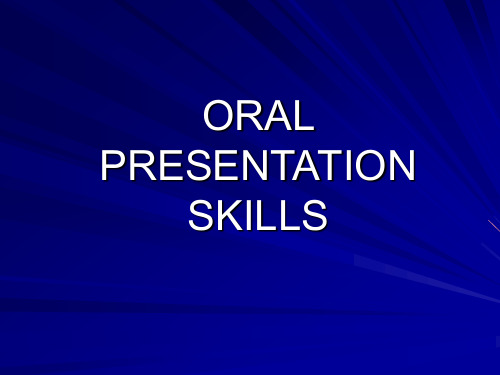
THE MIDDLE OR THE BODY
To refer to what an expert says:
– I quote the words of ... – In the words of… – According to... – Here I'd like to quote… – As Mr. X says in his book... – There is a famous quotation that goes...
practical example...
THE BEGINNING OR THE INTRODUCTION
Questions and comments from the audience.
– I'd ask you to save your questions for the end. – There will be plenty of time at the end of my
THE MIDDLE OR THE BODY
To refer to what you will say:
– We will see this a little later on. – This will be the subject of part 3. – We will go into more detail on that later.
– Listing information – Lists are often a necessary evil. Vary your language
whenever possible and avoid reree things we have to consider: one, two,
学术论文写作oral presentation

Topic
Analysis the development strategy of the corporations facing the tide of online shopping
The necessity of the research
Online shopping has a great impact on traditional business.
Because of the intense market competition, enterprises in order to better survival, must reform to go with the trend. So It’s urgent and necessary to do this research.
Theoretical foundation:
1. Demand and supply theory 2. Perfect competition theory 3. Price theory 4. Business cycle theory
Methods
Methods of data collection
Limitations and suggestions
⒈Because the target is corporation, it’s hard to collect information. ⒉ The data is not very accurate ,so the people investigated should be more.
⒈Questionnaire about online shopping ⒉Interviews with owners of entity shops ⒊Investigations of Taobao shopkeepers ⒋Online observation of corporations’ E-business 5.Download online data
Oral Presentation
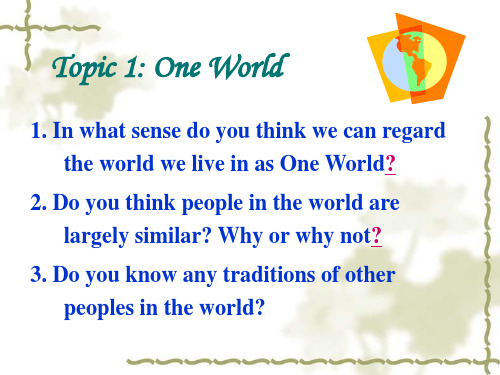
Topic 2: Birthday
4. What are the traditions of birthday celebrations in
some English-speaking countries such as Britain
and the U.S.? How do they differ from the Chinese ones? 5. Which is the most memorable birthday celebration you’ve had? Can you describe it?
6. What do you think is the best way to celebrate your
birthday?
Oral Presentation
不管在什么地方,人都有其相似的一面。这是 因为首先,我们的生命、我们的成长都有赖于 我们所生活的地球。其次,所有的人必须有食 物吃、有地方住、有活儿干;也必须爱别人, 同时被人爱。另外,作为这个世界的主人,我 们是一个大家庭,因为只有团结在一起我们才 能生存;也只有在一起我们才会尽力把世界变 的更好。
ways people celebrate their birthdays are
also various.
For example, in China, special noodles are served for lunch in honor of the birthday person. The noodles are extra long to symbolize longevity/ a long life; while in some other cultures, people celebrate birthdays with a cake topped with lighted candles, the number of which represents how old a person is turning. Actually, cakes, lights, and candles are often associated with the celebration of a person’s birthday in many Western countries.
一篇初一英文演讲稿Oral Presentation(附翻译)

一篇Oral Presentation(附翻译)Hello everyone .On this special day, it’s my pleasure to tell you my viewpoints on what happiness is about. Students may get happiness when they have got high scores on schooling. Employees may get happiness when they have got more salaries. Employers may get happiness when they have pursued maximum profits. But for me, happiness is very simple. One will feel comfortable and pleasant when he accompanies a girl on her side. You may get happiness when you are addicted to some hobbies such as playing music instrument, doing some handwriting or something else. Happiness will appear immediately if you have the belief of your own. Enjoy life and freedom. Well-being will stay with you for the lifetime.大家好,在今天这个特别的日子,我很高兴跟大家说说我对幸福的看法。
学生拿到高分就会有幸福感。
员工涨工资就会有幸福感。
老板获得最大化利益就会有幸福感。
但对我来说,幸福很简单。
Oral Presentations
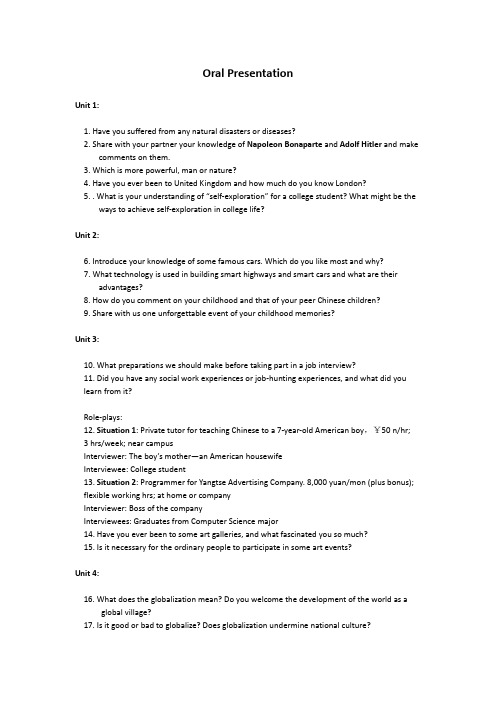
Oral PresentationUnit 1:1.Have you suffered from any natural disasters or diseases?2.Share with your partner your knowledge of Napoleon Bonaparte and Adolf Hitler and makecomments on them.3.Which is more powerful, man or nature?4.Have you ever been to United Kingdom and how much do you know London?5.. What is your understanding of “self-exploration” for a college student? What might be theways to achieve self-exploration in college life?Unit 2:6.Introduce your knowledge of some famous cars. Which do you like most and why?7.What technology is used in building smart highways and smart cars and what are theiradvantages?8.How do you comment on your childhood and that of your peer Chinese children?9.Share with us one unforgettable event of your childhood memories?Unit 3:10. What preparations we should make before taking part in a job interview?11. Did you have any social work experiences or job-hunting experiences, and what did you learn from it?Role-plays:12. Situation 1: Private tutor for teaching Chinese to a 7-year-old American boy,¥50 n/hr;3 hrs/week; near campusI nterviewer: The boy’s mother—an American housewifeInterviewee: College student13. Situation 2: Programmer for Yangtse Advertising Company. 8,000 yuan/mon (plus bonus); flexible working hrs; at home or companyInterviewer: Boss of the companyInterviewees: Graduates from Computer Science major14. Have you ever been to some art galleries, and what fascinated you so much?15. Is it necessary for the ordinary people to participate in some art events?Unit 4:16. What does the globalization mean? Do you welcome the development of the world as aglobal village?17. Is it good or bad to globalize? Does globalization undermine national culture?18. Introduce one book you’ve r ead about literature, or philosophy, or your professionalresearch which is the most influential one for you.19. What in your opinion is the most characteristic communication means of the modern time? Unit 5:20. Why do some people tend to be heartless and cruel? Were they born that way or didcircumstances harden them?21. Do some people care too much for people in general and forget the needs of their familymembers or relatives?22. What kinds of volunteering would interest you in the future?23. Is it more important to give your money or your time to help others?Unit 6:24. Do you feel time-pressed on the campus and why?25. Make a contrast between your present-day life and your concept of the old-day life, andanalyze what are the causes for the changes.26. Debate: Is fast pace of life good to our society?27. Who is your hero and why do you choose him/her as your idol?Unit 7:28. Who is Osama bin Laden? And why has he been cursed by the world, especially by theAmericans?29. How much do you know about the September 11 Attacks?30. How much do you know the terrorism and separatism in China?31. What is the cyber terrorism, and what could be the threats of the cyber terrorism?Unit 8:32. Could you mention some famous falls, jungles, deserts or mountains on Earth? Which among them is /are your dreamed destination(s)?33. Would an adventurous hiking to an out-of-the-way place such as a jungle, desert, or remote mountainous areas be worthwhile?34. Can you imagine why many climbers dream of the ascent of the Mount Everest(Qomolangma)?35. How do you celebrate your high days and holidays on the campus of university?36. Does your family celebrate some special occasions and how?。
学术会议Oral Presentation Skills【优质PPT】

– Now that we've seen... let us turn to…
2021/5/27
13
THE MIDDLE OR THE BODY
ORAL PRESENTATION
SKILLS
2021/5/27
1
I. PREPARATION AND PLANNING
1. ESSENTIAL PREPARATION AND PLANNING CHECKLIST
--- My Aim/purpose? --- My Title? --- My Target Audience? --- My Main Points? --- My
Announce your outline.
– I have broken my speech down/up into X parts.
– I have divided my presentation (up) into Y parts.
– In the first part I give a few basic definitions. – In the next section I will explain – In part three, I am going to show... – In the last part I would like/want to give a
– What I want my listeners to get out of my speech is... – If there is one thing I'd like to get across to you today
oralpresentation英语作文
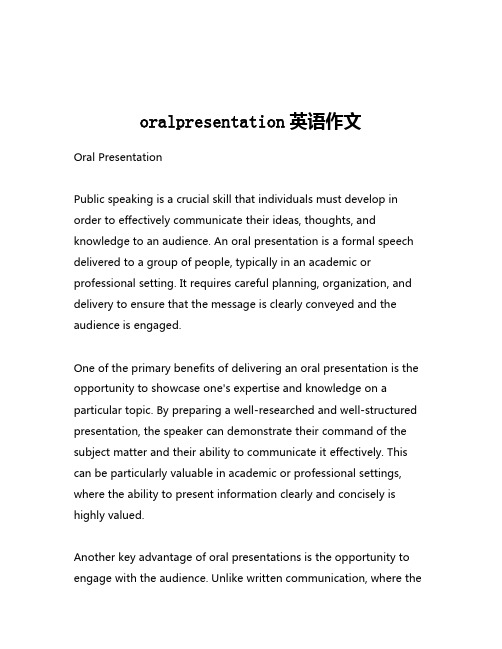
oralpresentation英语作文Oral PresentationPublic speaking is a crucial skill that individuals must develop in order to effectively communicate their ideas, thoughts, and knowledge to an audience. An oral presentation is a formal speech delivered to a group of people, typically in an academic or professional setting. It requires careful planning, organization, and delivery to ensure that the message is clearly conveyed and the audience is engaged.One of the primary benefits of delivering an oral presentation is the opportunity to showcase one's expertise and knowledge on a particular topic. By preparing a well-researched and well-structured presentation, the speaker can demonstrate their command of the subject matter and their ability to communicate it effectively. This can be particularly valuable in academic or professional settings, where the ability to present information clearly and concisely is highly valued.Another key advantage of oral presentations is the opportunity to engage with the audience. Unlike written communication, where theaudience is passive, an oral presentation allows the speaker to interact with the audience, respond to their questions and concerns, and gauge their level of understanding. This interactive nature can help to create a more dynamic and engaging learning environment, and can also help the speaker to tailor their message to the specific needs and interests of the audience.Effective oral presentations also require strong organizational and time management skills. The speaker must be able to structure their presentation in a clear and logical manner, with a clear introduction, body, and conclusion. They must also be able to manage their time effectively, ensuring that they cover all of the necessary information within the allotted time frame.In addition to these practical benefits, delivering an oral presentation can also help to build confidence and public speaking skills. By regularly engaging in this type of communication, individuals can become more comfortable and confident in their ability to speak in front of others. This can be particularly valuable in academic and professional settings, where the ability to communicate effectively is often a key factor in career success.Overall, the importance of oral presentations cannot be overstated. Whether in an academic, professional, or personal setting, the ability to effectively communicate one's ideas and knowledge to anaudience is a valuable skill that can have a significant impact on an individual's success and personal growth.。
英语人教版unit11作文
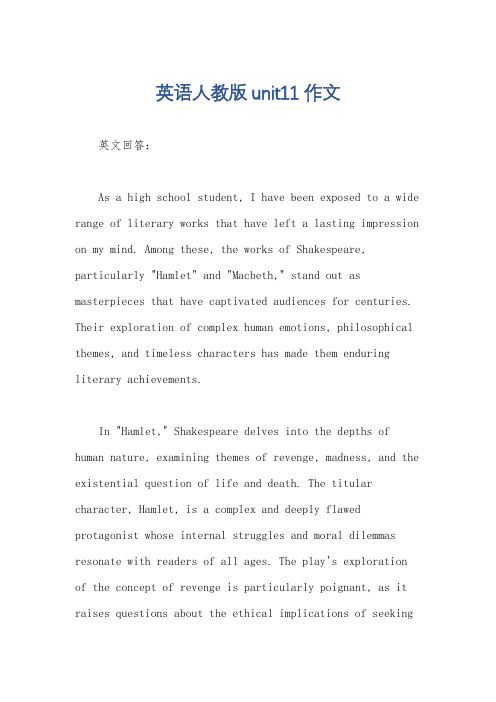
英语人教版unit11作文英文回答:As a high school student, I have been exposed to a wide range of literary works that have left a lasting impression on my mind. Among these, the works of Shakespeare, particularly "Hamlet" and "Macbeth," stand out as masterpieces that have captivated audiences for centuries. Their exploration of complex human emotions, philosophical themes, and timeless characters has made them enduring literary achievements.In "Hamlet," Shakespeare delves into the depths of human nature, examining themes of revenge, madness, and the existential question of life and death. The titular character, Hamlet, is a complex and deeply flawed protagonist whose internal struggles and moral dilemmas resonate with readers of all ages. The play's exploration of the concept of revenge is particularly poignant, as it raises questions about the ethical implications of seekingretribution."Macbeth," another masterpiece by Shakespeare, explores the destructive power of ambition and the corrosive effects of guilt. The play follows the titular character, Macbeth, as he succumbs to his own ambition and commits a series of heinous crimes in order to secure the throne of Scotland. Shakespeare's exploration of Macbeth's descent into madness and the consequences of his actions serves as a powerful cautionary tale about the dangers of unchecked ambition.Beyond the works of Shakespeare, I have also been deeply moved by the writings of Jane Austen and Charles Dickens. Austen's novels, such as "Pride and Prejudice" and "Sense and Sensibility," offer a witty and insightful portrayal of society and relationships. Her characters are complex and relatable, and her stories explore the themes of love, marriage, and social status. Dickens, on the other hand, was a master of social commentary, using his novels to expose the injustices and inequalities of Victorian society. Works such as "Oliver Twist" and "Great Expectations" highlight the plight of the poor andmarginalized, while also offering hope and redemption.In addition to these classic works of literature, I have also enjoyed contemporary novels by authors such as J.K. Rowling, Jhumpa Lahiri, and Khaled Hosseini. Rowling's "Harry Potter" series has captured the imaginations of readers worldwide, while Lahiri's "Interpreter of Maladies" explores the experiences of Indian immigrants in America. Hosseini's "The Kite Runner" offers a powerful account of the consequences of war and the enduring bonds of friendship.Through my literary explorations, I have not only gained an appreciation for the power of language and storytelling but also developed a deeper understanding of human nature and the human condition. Literature has expanded my worldview, challenged my perspectives, and provided me with invaluable insights into the complexities of life.中文回答:作为一名高中生,我接触过广泛的文学作品,这些作品在我心中留下了深刻的印象。
九年级unit11英语写作范文
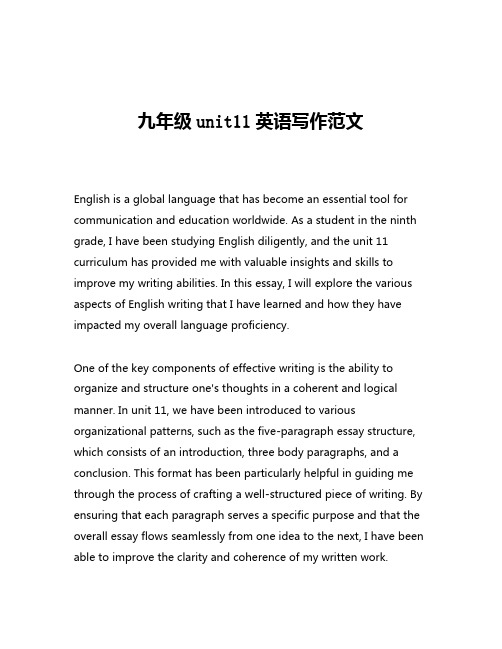
九年级unit11英语写作范文English is a global language that has become an essential tool for communication and education worldwide. As a student in the ninth grade, I have been studying English diligently, and the unit 11 curriculum has provided me with valuable insights and skills to improve my writing abilities. In this essay, I will explore the various aspects of English writing that I have learned and how they have impacted my overall language proficiency.One of the key components of effective writing is the ability to organize and structure one's thoughts in a coherent and logical manner. In unit 11, we have been introduced to various organizational patterns, such as the five-paragraph essay structure, which consists of an introduction, three body paragraphs, and a conclusion. This format has been particularly helpful in guiding me through the process of crafting a well-structured piece of writing. By ensuring that each paragraph serves a specific purpose and that the overall essay flows seamlessly from one idea to the next, I have been able to improve the clarity and coherence of my written work.Another essential aspect of English writing that we have explored in unit 11 is the use of appropriate and varied vocabulary. As a language learner, I have often struggled with finding the right words to convey my ideas effectively. However, through the study of vocabulary-building strategies, such as using context clues, word roots, and prefixes and suffixes, I have been able to expand my lexical repertoire and incorporate more precise and descriptive language into my writing. This, in turn, has helped me to better express my thoughts and emotions, and to engage my readers more effectively.In addition to vocabulary development, unit 11 has also emphasized the importance of using proper grammar and mechanics in writing. We have learned about the various parts of speech, sentence structures, and punctuation rules, and have practiced applying these concepts in our own writing. By developing a stronger understanding of the fundamental rules of English grammar, I have been able to produce more accurate and polished written work, which has not only improved the overall quality of my essays but has also enhanced my confidence as a writer.One of the most valuable lessons I have learned in unit 11 is the importance of revising and editing one's writing. We have been taught to approach the writing process as a cyclical, rather than a linear, endeavor, where we continuously refine and improve our workbased on feedback and self-reflection. This has been particularly helpful in addressing common writing challenges, such as maintaining a consistent tone and voice, ensuring logical flow and coherence, and identifying and correcting grammatical and mechanical errors. By embracing the revision process, I have been able to produce writing that is more polished, engaging, and effective.Moreover, unit 11 has also emphasized the significance of audience awareness in writing. We have learned to consider the needs, expectations, and perspectives of our intended readers, and to tailor our writing accordingly. This has helped me to develop a more nuanced understanding of how to effectively communicate with different audiences, whether they are peers, teachers, or members of the general public. By adapting my writing style, tone, and content to the specific needs of my audience, I have been able to create more impactful and meaningful written work.Finally, unit 11 has also provided me with opportunities to explore various genres and modes of writing, such as persuasive essays, research reports, and creative narratives. This exposure to a diverse range of writing styles has not only broadened my understanding of the English language but has also allowed me to experiment with different approaches and techniques, ultimately helping me to develop a more versatile and well-rounded set of writing skills.In conclusion, the lessons and skills I have acquired in unit 11 of my ninth-grade English curriculum have been instrumental in shaping me as a more confident and proficient writer. From mastering organizational structures and vocabulary development to honing my grammar and mechanics, and from embracing the revision process to considering audience awareness, I have gained a deeper appreciation for the art of written communication. As I continue my educational journey, I am confident that the knowledge and skills I have acquired in unit 11 will continue to serve me well, enabling me to express my thoughts and ideas with clarity, creativity, and impact.。
学术口语汇报英语作文
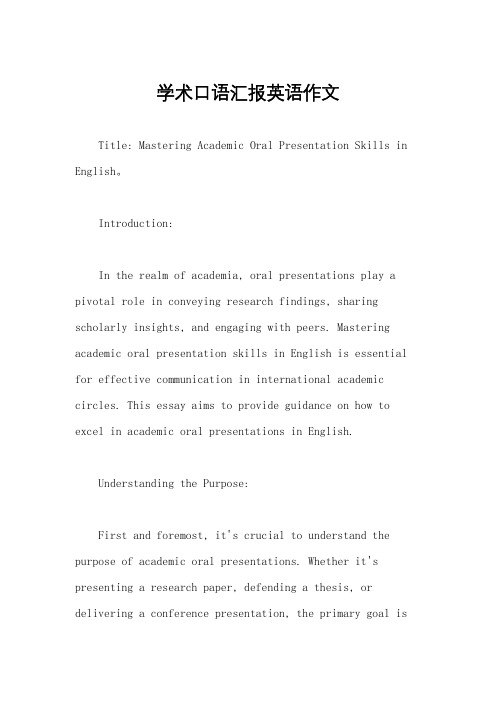
学术口语汇报英语作文Title: Mastering Academic Oral Presentation Skills in English。
Introduction:In the realm of academia, oral presentations play a pivotal role in conveying research findings, sharing scholarly insights, and engaging with peers. Mastering academic oral presentation skills in English is essential for effective communication in international academic circles. This essay aims to provide guidance on how to excel in academic oral presentations in English.Understanding the Purpose:First and foremost, it's crucial to understand the purpose of academic oral presentations. Whether it's presenting a research paper, defending a thesis, or delivering a conference presentation, the primary goal isto communicate ideas clearly, concisely, and convincingly to an audience.Structuring Your Presentation:A well-structured presentation enhances clarity and comprehension. Consider the following framework:1. Introduction: Begin with a concise introduction that outlines the topic, its significance, and the structure of your presentation.2. Main Body: Divide the main content into logical sections, each addressing specific aspects of your topic. Use clear headings to guide your audience through the presentation.3. Conclusion: Summarize key points, reiterate the main argument, and offer concluding remarks. Leave the audience with a memorable takeaway.Mastering Language and Delivery:Language proficiency and delivery are paramount in academic oral presentations. Here are some tips to enhance your language skills and delivery:1. Vocabulary: Expand your academic vocabulary to express complex ideas accurately. Utilize discipline-specific terminology where appropriate.2. Clarity: Speak clearly and at a moderate pace. Avoid using overly complex language or jargon that may confuse your audience.3. Pronunciation: Practice correct pronunciation of words to ensure clarity of communication.4. Confidence: Project confidence through your posture, gestures, and tone of voice. Maintain eye contact with the audience to establish rapport.5. Practice: Rehearse your presentation multiple times to familiarize yourself with the content and improve yourdelivery.Engaging Your Audience:An engaging presentation captivates the audience and encourages active participation. Incorporate the following strategies to keep your audience engaged:1. Visual Aids: Use visuals such as slides, graphs, and diagrams to complement your verbal presentation. Ensurethat visuals are clear, relevant, and enhance understanding.2. Interaction: Encourage interaction by asking questions, soliciting feedback, or inviting discussion. Engage with your audience to foster a dynamic exchange of ideas.3. Storytelling: Incorporate anecdotes, case studies,or real-life examples to illustrate key points and makeyour presentation more relatable.4. Varied Delivery: Avoid monotony by varying yourdelivery style. Incorporate humor, rhetorical questions, or dramatic pauses to maintain interest.Handling Questions:Anticipate and prepare for questions that may arise during or after your presentation. Follow these tips to handle questions effectively:1. Active Listening: Listen attentively to the question, ensuring that you understand it fully before responding.2. Clarification: Seek clarification if the question is unclear or ambiguous.3. Conciseness: Keep your responses concise and to the point. Avoid going off on tangents or delving intoirrelevant details.4. Diplomacy: Maintain a respectful and professional demeanor, even if faced with challenging or critical questions.5. Humility: Acknowledge any limitations or areas where further research is needed. Be open to constructive feedback and demonstrate a willingness to learn.Conclusion:Mastering academic oral presentation skills in English requires a combination of language proficiency, effective delivery, audience engagement, and adept handling of questions. By following the strategies outlined in this essay and engaging in regular practice, you can enhance your ability to communicate your ideas effectively in academic settings. Remember, effective communication is not just about what you say but how you say it and how well you connect with your audience.。
oral presentation

I’m a graduate from shanghai university. It’s time for me to choose my career.After being interviewed by several companies ,I was surprised to find that the opportunities didn’t match with my major. So I get confused. I have no idea about whether I pursue further study or go on hunting a job to support myself .Although I hope a lot for my bright future ,the fierce competition in the society and no work experience have cost me a lot of good work opportunities. Nowadays some graduates choose to do poineering work,but I don’t have enough money to start my own business.I was in such a dilemma that it’s impossible for me favorite career ,while I was also indifferent in other occupations.When I was junior student,I planned to go abroad for further study.Finally,I gave it up because I thought there would be many chances after graduation in shanghai ,a international city,which had been developing rapidly in recent years.So I think the priority is to improve my skills instead of complaining the current situation in our society.But I don’t know how to improve my skills.In addition,I have been to many cities and saw many great changes in these cities.I become more and more confused to choose whether to stay in shanghai or to go to other cities to find a better job.I have asked my parent’s opinions that they wanted me to stay and work in shanghai because they thought shanghai would gave me a good and bright future.When I was a freshman,I didn’t have a good plan for my future life.I thought my study was the most important thing.So I gave up a lot of opportunities to do some part-time jobs,which let me lose very precious work experience.Now I want to ask all of you present for help.Please give me some opinions to tell me what to do and how to do next.。
学术英语视听说unit11,LincolnandKennedy
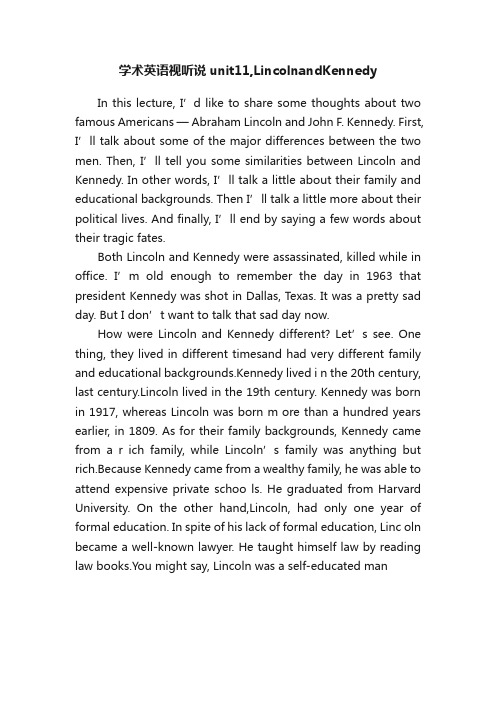
学术英语视听说unit11,LincolnandKennedyIn this lecture, I’d like to share some thoughts about two famous Americans — Abraham Lincoln and John F. Kennedy. First, I’ll talk about some of the major differences between the two men. Then, I’ll tell you some similarities between Lincoln and Kennedy. In other words, I’ll talk a little about their family and educational backgrounds. Then I’ll talk a little more about their political lives. And finally, I’ll end by saying a few words about their tragic fates.Both Lincoln and Kennedy were assassinated, killed while in office. I’m old enough to remember the day in 1963 that president Kennedy was shot in Dallas, Texas. It was a pretty sad day. But I don’t want to talk that sad day now.How were Lincoln and Kennedy different? Let’s see. One thing, they lived in different timesand had very different family and educational backgrounds.Kennedy lived i n the 20th century, last century.Lincoln lived in the 19th century. Kennedy was born in 1917, whereas Lincoln was born m ore than a hundred years earlier, in 1809. As for their family backgrounds, Kennedy came from a r ich family, while Lincoln’s family was anything but rich.Because Kennedy came from a wealthy family, he was able to attend expensive private schoo ls. He graduated from Harvard University. On the other hand,Lincoln, had only one year of formal education. In spite of his lack of formal education, Linc oln became a well-known lawyer. He taught himself law by reading law books.You might say, Lincoln was a self-educated man。
- 1、下载文档前请自行甄别文档内容的完整性,平台不提供额外的编辑、内容补充、找答案等附加服务。
- 2、"仅部分预览"的文档,不可在线预览部分如存在完整性等问题,可反馈申请退款(可完整预览的文档不适用该条件!)。
- 3、如文档侵犯您的权益,请联系客服反馈,我们会尽快为您处理(人工客服工作时间:9:00-18:30)。
(continued)
Results (4-6 slides) Present key results and key insights. This is main body of the talk. Its internal structure varies greatly as a function of the researcher's contribution. (Do not superficially cover all results; cover key result well. Do not just present numbers; interpret them to give insights. Do not put up large tables of numbers.)
The introduction of the presentation usually includes: greetings, self-introduction (name, position, affiliation and other related information), title or subject of the presentation, and an outline of the main parts of the presentation.
people to your paper). Methods (cover briefly in short talks; refer
people to your paper).
Body (2)
Results (Present key results and key insights. This is main body of the talk. Its internal structure varies greatly as a function of the researcher’s contribution. Do not superficially cover all results; cover key results well. Do not just present numbers, interpret them to give insights. Do not put up large tables of numbers.)
student preparing a presentation Conclusion
Structure of an oral presentation
Introduction Body Conclusion
Introduction
The oral presentation at international academic conference is often given to introduce the research done and the achievements made by the presenter.
Preparing your oral presentation (1)
First of all, think.......
Think about what you want to achieve: do you want to inform your audience, inspire them to think about your topic, or convince them of a particular point of view?
Summary (1 slide)
(continued)
Future Work (0-1 slides) Optionally give problems this research opens up.
Backup Slides (0-3 slides) Optionally have a few slides ready (not counted in your talk total) to answer expected questions. (Likely question areas: ideas glossed over, shortcomings of methods or results, and future work.)
Body (1)
In the body part of the presentation, the speaker either analyzes the problem step by step, or follows the procedure below:
Motivation and problem statement. Related work (cover superficially or omit; refer
Unit 11 Oral Presentation
Structure of an oral presentation Things to think about A Generic Conference Talk Outline Giving an Oral Presentation Ten ‘Dos’ and ‘Don’ts’ for a
conclusion
The speaker often ends his presentation by giving a brief summary and extending thanks to the audience.
Things to think about
1. Oral Communication is different from written communication
about the length of time you have to talk. Summarise your draft into points to write on
overheads and/or cards. Plan and prepare your visual aids. Rehearse your presentation and get its length right.
Ask a friend to listen and time you.
Organising the content
Introduction (may be written last)
Capture your listeners’ attention: Begin with a question, a funny story, a startling comment, or anything that will make them think.
Giving an Oral Presentation
Preparing your oral presentation Organising the content Delivering your presentation Using visual aids Dealing with nervousness
State your purpose; for example: ‘I’m going to talk about...’ ‘This morning I want to explain…’
Present an outline of your talk; for example: ‘I will concentrate on the following points: First of all…Then… This will lead to… And finally…’
The body
Present your main points one by one in logical order.
Pause at the end of each point (give people time to take notes, or time to think about what you are saying).
Think about your audience: what background knowledge do they have about your topic? Do they have any particular interests? How are you going to involve them in your presentation?
a dozen slides for a twenty minute presentation
Title/author/affiliation (1 slide) Forecast (1 slide)
Give gist of problem attacked and insight found (What is the one idea you want people to leave with? This is the "abstract" of an oral presentation.) Outline (1 slide) Give talk structure. Some speakers prefer to put this at the bottom of their title slide. (Audiences like predictability.)
(continued)
Background (2-4 slides) ○ Motivation and Problem Statement (1-2 slides)
(Why should anyone care? Most researchers overestimate how much the audience knows about the problem they are attacking.) ○ Related Work (0-1 slides) Cover superficially or omit; refer people to your paper. ○ Methods (1 slide) Cover quickly in short talks; refer people to your paper.
